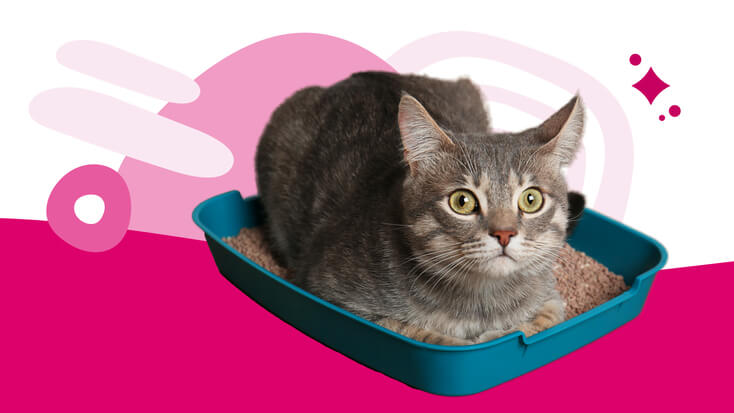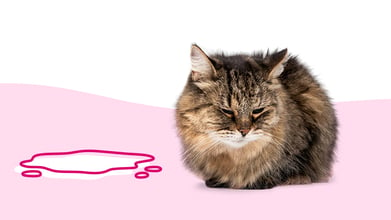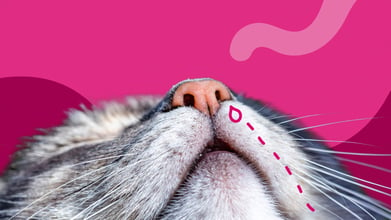Constipation in Cats: Causes, Symptoms, & Treatment

Table of Contents
As cat parents, it's important to keep a close eye on our feline friends’ health, and that includes their digestion. Believe it or not, how often our cats ‘go’ can have a big impact on their well-being.
So let's take a moment to understand constipation in cats - what it is, how to spot it, and what to do about it.
Key Takeaways:
- Cat constipation is a condition where cats struggle to pass stool, leading to discomfort and potential health issues.
- If a cat shows signs of constipation like infrequent litter box use, prolonged straining, or discomfort, consulting a vet is crucial.
- Maintaining hydration, providing a fiber-rich diet, ensuring exercise, and managing stress can prevent and alleviate cat constipation. Regular vet checkups help catch issues early.
What Is Constipation in Cats?
Constipation in cats means they're having a hard time passing stool. Normally, cats should have a bowel movement daily to every other day, but diet and hydration can affect defecation frequency. If your cat hasn't used the litter box in 3 days or more or appears to be straining, it's a sign of constipation.
This issue could be a one-off or recurring, but either way, it warrants attention and perhaps a doctor's intervention. Constipation causes the stool to become hard and dry in the colon, making it tough to pass. This straining can lead to minor liquid or blood passings, underlining the importance of treating constipation seriously.
Same-Day In-Home Sick Pet Visits
Don't wait for your pet's condition to worsen. Our mobile veterinarians provide same-day and next-day in-home sick pet visits. Schedule now for peace of mind.
Signs & Symptoms of Cat Constipation
Observing your cat's behavior is key to identifying constipation. While some signs are subtle and can be overlooked, others are more noticeable. Here is a list of signs that can accompany constipation:
- Changed Litter Box Habits: Your cat visits the litter box less frequently, or their stools are smaller, harder, or drier than usual.
- Extended Litter Box Time: Your cat spends an unusually long time in the litter box, indicating difficulty in passing stool.
- Discomfort or Distress: Your cat shows discomfort, such as meowing, crying, or unusual behavior in or around the litter box.
- Visible Straining: Your cat appears to be pushing hard but produces little or no stool.
- Loss of Appetite: Your cat starts to eat less than usual
- Lethargy: Your cat seems unusually tired or inactive
- Abdominal Pain: Your cat hunches over or reacts negatively when you touch their belly, indicating severe discomfort.
- Vomiting: In extreme cases, where constipation persists for several days, your cat may start vomiting.
Causes of Constipation in Cats
Various factors, from lifestyle issues to more serious health conditions, can contribute to cat constipation. These include inadequate water intake, obesity, lack of exercise, hairballs, underlying medical conditions like kidney disease and hyperthyroidism, obstructions, and orthopedic issues.
Here's a breakdown of these possible causes of your cat's constipation issues:
Inadequate water intake
If a cat doesn't get enough water, their body can extract water from the stool, making it hard and difficult to pass.
Obesity
Overweight cats have a higher risk of constipation. The added weight can put more pressure on the colon, making it harder for your cat to have regular bowel movements.
Lack of exercise
Cats who don't get enough physical activity can experience a slowdown in the passage of stool through their colon.
Hairballs
When cats groom themselves, they often ingest hair that can accumulate in their digestive tract and form hairballs, which can cause constipation.
Underlying medical conditions
Conditions such as kidney disease, hyperthyroidism, and certain neurological disorders can also lead to constipation in cats.
Obstructions
More serious causes of constipation include obstructions in the colon, such as tumors or swallowed foreign objects.
Orthopedic issues or injury
Orthopedic issues or injuries, particularly those involving the pelvis or hind legs, can make it difficult for a cat to position itself to defecate, leading to constipation.
When to See a Vet
If your cat hasn't had a bowel movement in over 3 days, is frequently constipated, or is showing signs of discomfort, it's time to visit your veterinarian.
The same goes for any other unusual symptoms like loss of appetite, lethargy, or vomiting. Sometimes, a bout of constipation may resolve itself, but consistent issues point to a larger problem that needs professional attention.
Ignoring constipation can lead to severe complications like obstipation, where a cat can't empty its colon, or megacolon, a painful condition characterized by an enlarged, dysfunctional colon. Plus, constipation can be a sign of other health issues such as kidney disease or hyperthyroidism.
Should My Pet Be Seen by a Veterinarian?
1. Have you noticed changes in your pet’s appetite?
2. Does your pet have diarrhea or loose stools?
3. Have you noticed changes in your pet’s thirst/water consumption?
4. Is your pet having accidents in the house?
5. Is your pet pacing and unable to settle?
6. Is your pet panting more than usual?
7. Is your pet whining or vocalizing more than usual?
8. Is your pet shaking more than usual?
9. Is your pet hiding or avoiding physical contact more than usual?
10. Is your pet more lethargic and sleeping more than usual?
11. Are you concerned about changes in your pet’s behavior?
12. Is your pet scratching their ears?
13. Is your pet licking their paws more than usual?
14. Does your pet have a rash?
15. Is your pet moving more slowly than usual or having a harder time getting up or down?
View Results
Should My Pet Be Seen by a Veterinarian?
1. Have you noticed changes in your pet’s appetite?
2. Does your pet have diarrhea or loose stools?
3. Have you noticed changes in your pet’s thirst/water consumption?
4. Is your pet having accidents in the house?
5. Is your pet pacing and unable to settle?
6. Is your pet panting more than usual?
7. Is your pet whining or vocalizing more than usual?
8. Is your pet shaking more than usual?
9. Is your pet hiding or avoiding physical contact more than usual?
10. Is your pet more lethargic and sleeping more than usual?
11. Are you concerned about changes in your pet’s behavior?
12. Is your pet scratching their ears?
13. Is your pet licking their paws more than usual?
14. Does your pet have a rash?
15. Is your pet moving more slowly than usual or having a harder time getting up or down?
Share Quiz
Treatment for Cats with Constipation
If your cat is constipated, a vet visit will likely include a physical exam and potentially diagnostic tests like blood work or X-rays to identify the cause. Treatment can vary based on the severity of constipation. Hydration is key, as it helps to soften stool. A fiber-rich diet and regular exercise can stimulate bowel movements.
In more serious cases, or if constipation progresses to a condition called megacolon where the colon becomes abnormally enlarged, your veterinarian might recommend laxatives, administer an enema, perform manual removal of feces, or in some instances, surgery might be necessary.
📒 Note: Always follow your doctor's guidance when treating your cat's constipation.
Prevention for Cats with Constipation
Here are some prevention tips to ensure your cat's digestive health:
1. Hydration and diet
To keep your cat's digestive system running smoothly, make sure they always have access to fresh water and incorporate canned or wet food into their diet. Fiber can be sprinkled onto their food, too, and can be very effective at addressing, and preventing, constipation.
2. Playtime and stress management
Playtime promotes activity and enrichment and helps keep things moving in the right direction. Managing your cat's stress levels is important, as stress can contribute to digestive issues.
3. Litter box hygiene
Ensure your cat's litter box is clean and inviting to use. If it's dirty, your cat might hold in their stool longer than they should, which can contribute to constipation.
4. Regular veterinary checkups
Regular veterinary checkups are crucial to keep track of your cat's health and prevent any issues before they become serious.
Conclusion
If you're noticing changes in your cat's litter box habits, don't ignore it - it could be constipation. Consult your veterinarian, who can suggest treatments from diet changes to medications. Remember, keeping your cat hydrated, well-fed, active, and up-to-date with vet visits is the best way to prevent issues. Let's keep our furry friends feeling their best!
Frequently Asked Questions
How does a cat act when constipated?
A constipated cat might visit the litter box more often but produce little to no stool, and they could show signs of discomfort like straining, crying, or acting unusual around the litter box.
How long does cat constipation last?
Cat constipation can vary in duration, but if your cat hasn't had a bowel movement in more than 3 days, it's time to consult a veterinarian.
How long can a cat go without pooping?
While it can vary, a healthy cat typically has a bowel movement once a day to once every other day. If your cat hasn't 'gone' for more than 3 days, it's time to seek veterinary advice.
Is there a laxative for cats?
Yes, there are cat-friendly laxatives available, both over-the-counter and prescription types. However, any medication should only be given under the guidance of a veterinarian.






